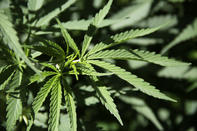Hemp (Cannabis sativa) is an ancient versatile crop that has been cultivated worldwide for millennia including the mid-20th century. In the 1930s to 40s its cultivation drastically declined due to legislation that prohibited hemp farming and any use of hemp products.

In hemp production fibres are used for strong durable textiles, building materials and paper. Hemp seeds contain high levels of antioxidants, fatty acids, minerals, and vitamins while the plant itself helps to stabilise soils.
While hemp oil, extracted either from the seeds or from the plant material, is used in foods, skincare, for industrial purposes and as medication.
What is Hemp?
Industrial hemp and marijuana (also known as ‘dagga’) are different cultivars of the same species, Cannabis sativa. Hemp has lower concentrations of the euphoric cannabinoid tetrahydrocannabinol (THC) and higher concentrations of cannabidiol (CBD).
Hemp is defined as any part of a cannabis plant in which the concentration of THC is 0.3% (w/w) or less. Due to the low levels of THC, hemp has none of the psychoactive effects of marijuana. CBD, present in both the hemp and marijuana strains, is a compound used to treat medical conditions such as epilepsy and Parkinson’s disease.
Hemp is a fast-growing, upright herb with leaves composed of five to seven leaflets. It is a versatile plant grown for its fibre and seeds. Hemp fibre is used for making textiles, paper, rope, insulation and biofuel while hemp seeds are used for human and animal food.
The seeds are also used to extract omega-rich hemp oil used for lubricants, paints, inks, plastics and cosmetic products such as shampoos and soaps. The waste product of the oil extraction (hemp seed cake) is rich in protein and can be used for animal feed or refined into a high-protein hemp flour for human consumption.
World Production of Hemp
The world’s top producer of hemp has always been China. In fact, the first recorded use of hemp was in China in the year 300 A.D. and commercial hemp farming has continued without any legislative interference.
The main use of hemp in China was for food and fibre (for textiles) and helped the nation survive during food shortages. It is estimated that China has more than 100 000 ha of hemp.
Canada’s production of hemp increased by 80% between 2016 and 2017 to 56 000 ha. Canada focusses on oil extraction, hemp protein powders and hulled hemp seeds (hemp hearts).
The United States has tripled its hemp production since the passing of the 2018 Farm Bill, allowing the commercial cultivation of hemp. CBD-oil production is the main product of USA hemp production.
Other top producers of hemp in the world are France (never banned), Chile (private cultivation is allowed) and North Korea (never banned). North Korea grows hemp on an industrial scale, but the ingestion on marijuana cannabis can be punishable by death.
Limitations in Hemp Farming
In South Africa, the farming of hemp still falls under the cannabis legislation and therefore is still identified as a controlled substance – no different from marijuana, says Gill Staniland founding member of Cannabis Industry Development Cooperative of the Western Cape (CIDCWC). CIDCWC is an organisation advocating for rational laws based on science and current knowledge of the cannabis plant and its products.
It is not only in South Africa that the production of hemp is restricted, albeit not because of governmental ignorance. Canadian studies published in 2015, indicated several limitations surrounding the processing of hemp.
These include negative public perceptions, over-restrictive legal requirements and insufficient technological capabilities.
In the USA, production is limited by legislative hold-ups and in nine US states, the production of hemp is not yet legalised. Other limiting factors are insurance, financing of hemp farming and seed supply. US farmers import seeds from Europe and Canada.
By Marinda Louw
For bulk or Hemp export enquiries please use the enquiry link below.